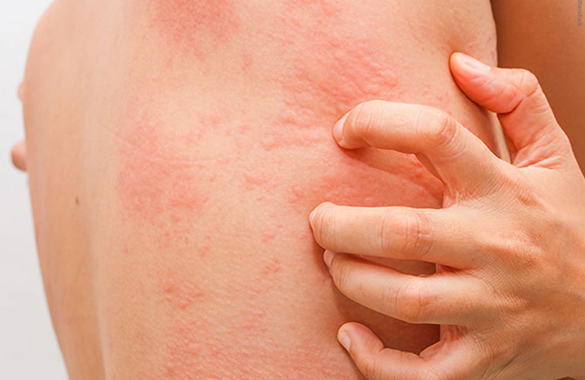Quick Inquiry


For the best Urticaria treatment in Delhi, Dermasure is the one stop destination, where our expert team is dedicated to provide personalised care and effective solutions. Under the expertise of Dr. Shirin Bakshi’s Dermasure clinic, urticaria/hives treatment in Delhi is being performed under assured dermatological assistance.

Hives or urticaria is a skin reaction that causes bumps, raised patches, or both that suddenly appear on the skin. These bumps and raised patches may appear swollen and are often itchy. The medical name for hives is urticaria. Hives are not contagious and one cannot get hives by touching someone else’s hives or being around someone who has hives.
Allergic Reactions: Food, medications, insect stings, or latex.
Environmental Factors: Pollen, pet dander, dust mites, or mould.
Physical Triggers: Pressure, temperature changes, sunlight, or exercise.
Infections: Viral or bacterial infections.
Stress: Emotional or physical stress can trigger hives.
Hormonal Changes: Menstrual cycles or hormonal fluctuations.
Autoimmune Conditions: Disorders like lupus or thyroid disease.
Chronic Conditions: Conditions such as chronic urticaria.
Living with urticaria can affect one’s quality of life. Some people claim to feel a loss of control because they never know when hives will appear. Though, hives often worsen during the night. This can make it difficult to sleep.
A continual loss of sleep can make you feel tired and irritable. Some people develop anxiety or depression. All of this can affect the person’s ability to do well in school or at work.
After the cause for urticaria or hives is known, we draft your treatment plan that is tailored to your needs and may include one or more of the following:
Prax lotion or menthol cream is advised for temporary relief from the itch.
When hives are severe, a medication like prednisone can reduce the inflammation and itch. For milder hives, your dermatologist may prescribe a corticosteroid that you apply to your skin to help relieve the itch.
This is an injectable medication that is used to treat chronic hives. It’s prescribed when antihistamines fail to work.
This medication can help control the itch and swelling. You can buy some antihistamines like cetirizine, loratadine, and Benadryl without a prescription. Benadryl can make you sleepy, so it’s best taken at bedtime. If you need a stronger antihistamine, your dermatologist may prescribe doxepin.
This is a non-invasive treatment that can be effective when antihistamines don’t work. It requires several trips a week for a few months to your dermatologist or phototherapy treatment centre.
With these latest treatment options and rehabilitation options, you can trust DermaSure to get relief from Hives and make the most of your life. Visit our clinic to get a personalised plan for Urticaria treatment.
By choosing Dermasure Clinic patients can benefit from targeted and effective management of urticaria, leading to improved quality of life. It is the ideal destination to provide the Urticaria/Hives treatment in Delhi.
Yes, stress can be a common trigger for urticaria. Emotional stress and anxiety can lead to the release of certain chemicals in the body that can cause hives to appear or worsen existing symptoms.
No, urticaria itself is not contagious. It is not caused by an infection or a contagious agent. However, certain underlying causes of urticaria, such as a viral infection, may be contagious.
Yes, certain medications can trigger urticaria in some individuals. Common culprits include antibiotics (such as penicillin), nonsteroidal anti-inflammatory drugs (NSAIDs), and aspirin. It’s important to inform your healthcare provider about any medication allergies or previous reactions.
In some cases, urticaria symptoms can involve an underlying medical condition, such as an autoimmune disorder, thyroid disease, or a chronic infection. If hives persist or recur frequently, it is advisable to consult a healthcare professional for further evaluation.
Urticaria treatment involves identifying and avoiding triggers, practising good skincare, and taking appropriate medications as prescribed. Applying cool compresses to the affected area, wearing loose-fitting clothing, and using fragrance-free products can help alleviate symptoms. It may also be helpful to keep a diary to track potential triggers and discuss them with your healthcare provider for personalised management strategies.
Leave Them To #1 Skin & Hair Specialist In Delhi